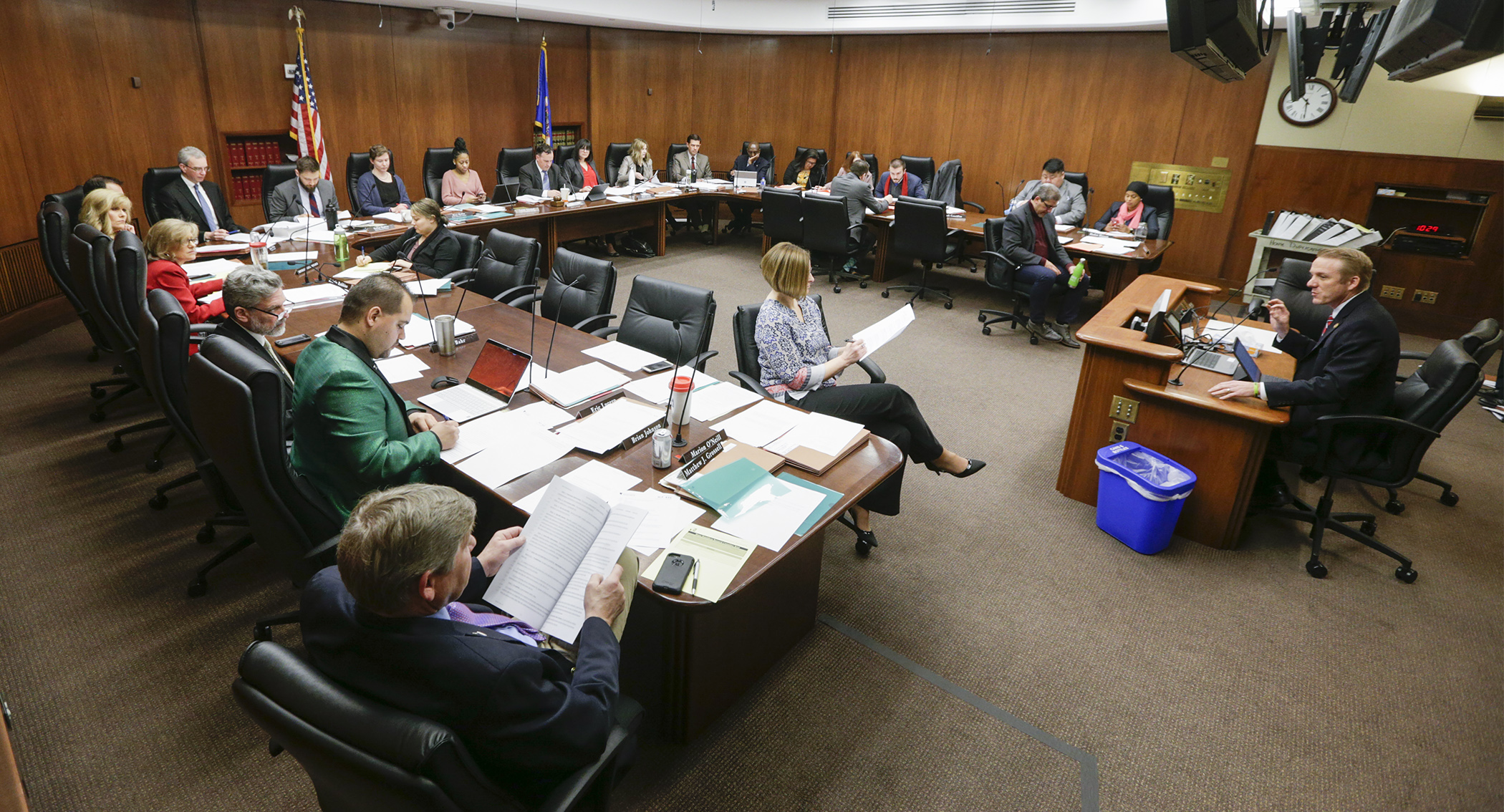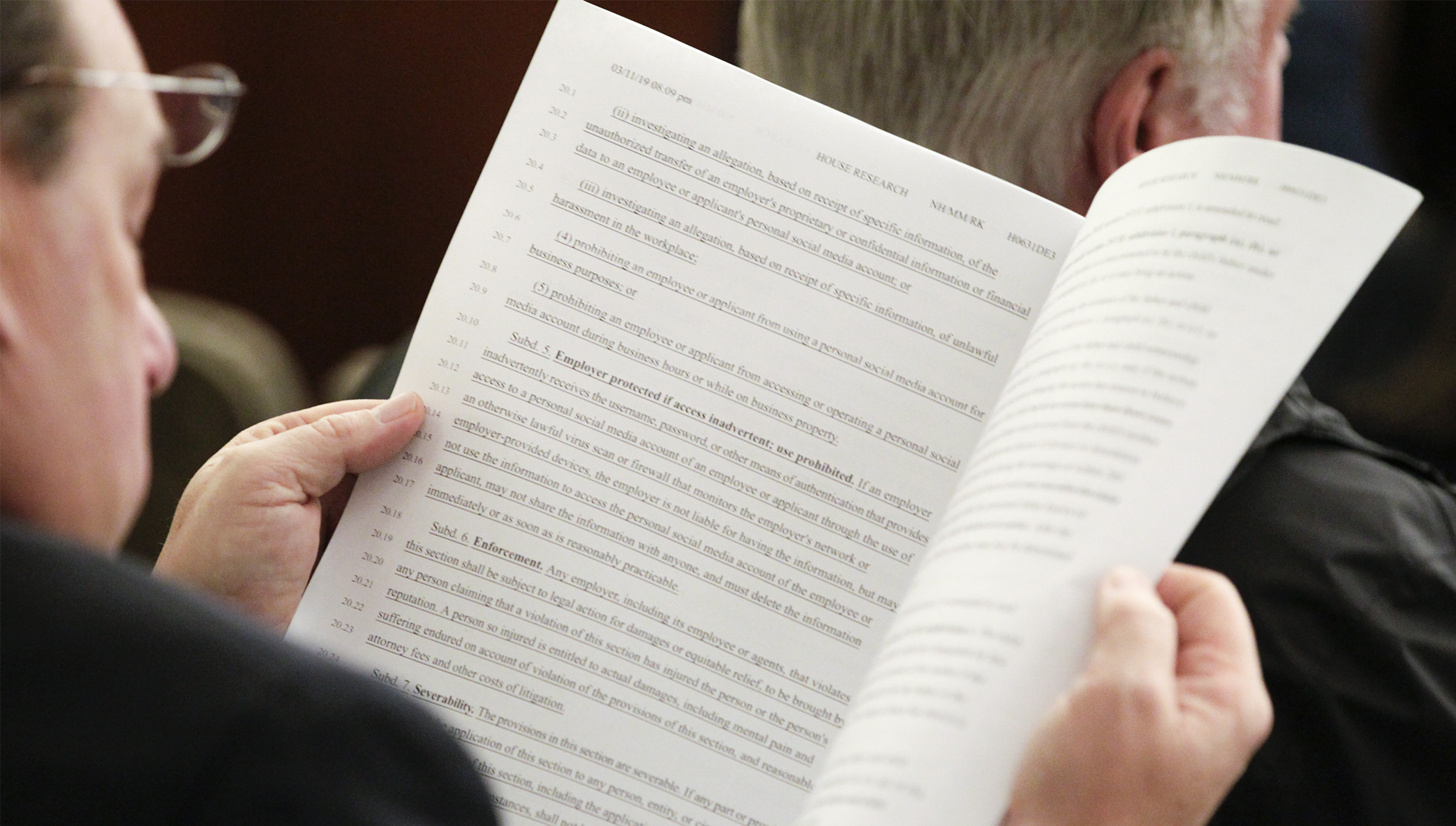Panel sends omnibus data practices and civil law bill to House Floor

A positive judgment was handed down on a bill that covers several judicial and civil law topics.
Sponsored by Rep. John Lesch (DFL-St. Paul), HF631 as amended, would, in part, modify private/public data practices, require warrants to track individuals using location-tracking devices, prevent an employer from accessing an employee’s private social media data, and change some procedures used by family courts in divorce proceedings.
The omnibus data practices and civil law policy bill, HF631, was approved late Thursday by the House Judiciary Finance and Civil Law Division and sent to the House Floor.
Most of the debate and the testimony focused on presumption of parenting time.
 A member of the audience looks through the delete-all amendment to HF631, the omnibus data practices and civil law policy bill, as the House Judiciary Finance and Civil Law Division begins to take amendments March 14. Photo by Paul Battaglia
A member of the audience looks through the delete-all amendment to HF631, the omnibus data practices and civil law policy bill, as the House Judiciary Finance and Civil Law Division begins to take amendments March 14. Photo by Paul BattagliaSponsored by Rep. Peggy Scott (R-Andover), HF1666, heard in the division last week, proposes requiring family courts to have an “equal parenting time presumption” when deciding upon allocating parenting time for each parent in a divorce proceeding. Current law has a 25 percent minimum presumption of parenting time for one parent in a divorce proceeding.
Initially included in the delete-all amendment, an amendment successfully offered by Rep. Kelly Moller (DFL-Shoreview) removed the language and would leave the 25 percent minimum in place. It would also prohibit courts from considering a parent’s marital status in determining parenting time or custody.
Among her arguments, Moller said an equal 50-50 percent presumption could require domestic abuse victims to present to a judge “clear and convincing evidence” of the abuse in order to lower or deny parenting time to the other parent.
That would have a “chilling effect” on domestic abuse victims, said Moller, who noted that victims often do not have the resources to meet that high legal standard in court.
The other major debate focused on how state agencies handle unauthorized release of private data.
Current law requires state agencies to notify people or other parties affected when their private data maintained by the state has been accessed by an unauthorized person “with the intent to use the data for nongovernmental purposes.”
The bill would eliminate the “intent provision,” meaning that all unauthorized data breaches by the state would require notification.
Rep. Andrew Carlson (DFL-Bloomington) unsuccessfully offered an amendment to give state agencies leeway to review whether a data breach was sufficiently serious to warrant notification. That would occur only if “the unauthorized acquisition creates a significant risk of financial, reputational, or other harm to the subject of the data.”
The amendment provided a needed framework for state agencies to make notification decisions in a uniform, standardized way, Carlson said.
Rep. Eric Lucero (R-Dayton) said that was akin to “putting the fox in charge of the henhouse.”
Other notable provisions would:
- impose limits on law enforcement use of location-tracking devices;
- expand a private/nonpublic classification of rideshare data so that it includes rideshare programs administered by any government entity;
- expand the prohibition on enabling location tracking capabilities of ignition interlock devices without a court order to include prohibiting location tracking by GPS or cellphone;
- prohibit employers from demanding password and username information to gain access to an employee’s social media accounts;
- impose new requirements on warrants for electronic communication information;
- extend time limits to establish non-paternity;
- specify that divorcing parents who have not agreed to custody or parenting time must attend a parenting education program;
- require courts to notify divorcing parties they have the option to resolve their disputes through private mediation;
- prohibit family courts from considering a parent’s marital status when determining parenting or custody decrees; and
- amend requirements for background studies for parents who are guardians of their children.
What’s in the bill?
The following are selected bills that have been incorporated in part or in whole into the omnibus data practices and civil law policy bill:
- HF54 (Scott)
- HF298 (Lien)
- HF361 (Liebling)
- HF561 (Lesch)
- HF631 (Lesch)
- HF1196 (Lesch)
- HF1197 (Lesch)
- HF1521 (Scott)
- HF1567 (Lesch)
Related Articles
Search Session Daily
Advanced Search OptionsPriority Dailies
Ways and Means Committee OKs proposed $512 million supplemental budget on party-line vote
By Mike Cook Meeting more needs or fiscal irresponsibility is one way to sum up the differences among the two parties on a supplemental spending package a year after a $72 billion state budg...
Meeting more needs or fiscal irresponsibility is one way to sum up the differences among the two parties on a supplemental spending package a year after a $72 billion state budg...
Minnesota’s projected budget surplus balloons to $3.7 billion, but fiscal pressure still looms
By Rob Hubbard Just as Minnesota has experienced a warmer winter than usual, so has the state’s budget outlook warmed over the past few months.
On Thursday, Minnesota Management and Budget...
Just as Minnesota has experienced a warmer winter than usual, so has the state’s budget outlook warmed over the past few months.
On Thursday, Minnesota Management and Budget...